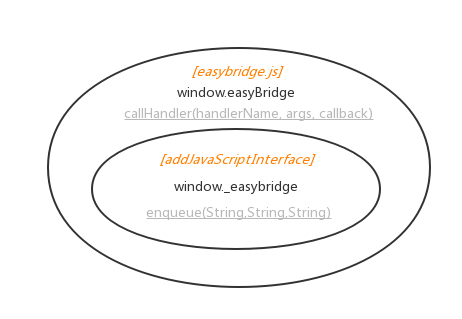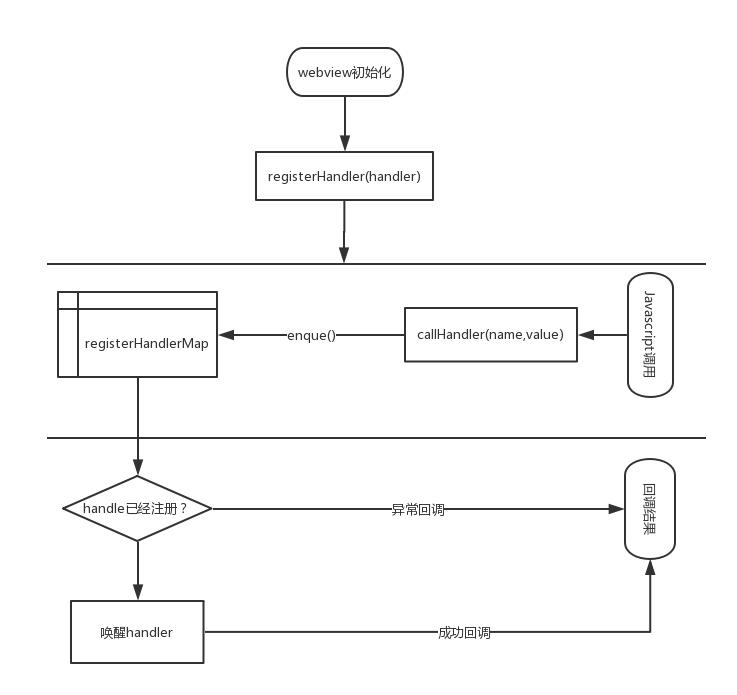EasyBridge
(中文文档在这里)
2017/05/02
- fix the bug that can not get the correct value when calling JavaScript in Java with object type value returned
- add
OnBridgeInjectedListener,it's available to observe the bridge injected event in Java code now.
2017/04/20 add Logger that will log the important information which is helpful for debug
2017/04/09 adding the retry mechanism of injecting bridge
2017/04/08 invoke Java synchornized from Javascript is now enable in
feature/syncNow the
BridgeHandlerhas two function to be invoked from JavaScript.If the JavaScirpt invoke Java with a callback function,the Java method will be invoked Synchronizlly ,otherwise the Java method will be invoked asynchronous.the feature/sync may be merged into master oneday future
FEATURES
✔️Inject Bridge with retry mechanism
Now when EasyBridge try to inject a comunication bridge into the page,it will retry at most five times to make sure that the bridge is injected successfully .It works as below:
EasyBridgeWebViewwill register a handler name "injectFinished" default- when the bridge injected finish,it will invoke the handler in step one, and set the injected status to be true
- When injecting a bridge ,it will start a task
InjectBridgeTask,it will try to inject the bridge every 300ms at most 5 times,if the injected status is false
because of the single thread mechanism in JavaScrpt,we will make sure that the bridge will not be injected twice in the same page
✔️ Register Handler with APT
Now you can register Handlers using the APT tech.Follow the steps:
- add the jitpack dependencies as below ;
- add the annotation
@EasyBridgeHandlerto your handler; - A class Named
EBHandlerManagerwill be generated after buiding the project; - call the static method
EBHandlerManager#register(webview)when you init the webview for the activity/fragment.
✔️ Using Java IN JavaScript
EasyBridge allow you to invoke Java function both in Synchronize and Asynchronous ways.(But it's pity that the Asynchronous way is only opened for you nowadays)
Follow the steps:
- Register the document event
WebViewJavascriptBridgeReadyin your JavaScript logic; - Using the
easyBridge#callHandler(handlerName, args, callback)in your JavaScript when you received the event that the bridge had been injected.The object namedeasyBridgecan be renamed as you like.
✔️ Using JavaScript IN Java
You can call all the JavaScirpt function that had been registed to the easyBridge.Steps as follow:
- Register the document event
WebViewJavascriptBridgeReadyin your JavaScript logic; - Using the
easyBridge#registerHandler(handlerName, handler)to registed all the functions that you want to be invoked in Java; - Calling the function
EasyBridgeWebView#callHandler(handlerName,parameters,resultCallBack)in Java layer to reach your JavaScript functions.
✔️ Global Security Policy Check
Global Security check will be actived once you had defined it before in the situations below:
Time at bridge Injecting in Java layer
no bridge object will be injected if breaking the rule of global security check.The old bridge object injected in the previous page also will be removed .
Time at calling the Java functions in JavaScript layer
No Java functions will be invoked if breaking the rule of global security check.
✔️ Security policy check on Handlers
The last point to make a security check based on the security policy of the handler that is about to be invoked in JavaScript.
You can set your policy according to the current page's url and the parameters you received from JavaScript
DEPENDENCIES
EasyBridge had been pubished to Jitpack, add the dependencies to your project before using it,follow the steps:
add the Jitpack responsitory
allprojects { repositories { ... maven { url 'https://jitpack.io' } } }add the core dependencies of EasyBridge
dependencies { compile 'com.github.easilycoder.EasyBridge:easybridge:0.0.1'// change the version to the newest one }If you would to try to APT tech for registing handler ,add the dependencies below
dependencies { compile 'com.github.easilycoder.EasyBridge:easybridge-annotation:0.0.1' // change the version to the newest one annotationProcessor 'com.github.easilycoder.EasyBridge:easybridge-processor:0.0.1' // change the version to the newest one }Add the progurad rules to your file
-keepclassmembers class tech.easily.easybridge.lib.EasyBridge{ public *; } -keepclassmembernames class tech.easily.easybridge.lib.CallBackMessage{ <fields>; }
功能
✔️ 注入 jsbridge 添加重试机制
现在当我们往页面中注入 bridge 的时候,具备了重试机制。EasyBridge 最多会尝试 5 次重试,尽可能的确保 bridge 被注入成功。重试机制的工作流程如下:
- 当我们初始化
EasyBridgeWebView的时候,它会默认的注册一个名称为injectFinished的 handler,用以监听 bridge 注入成功,并设置标志值 - 在 bridge 注入成功之后,会调用上面注册的那个 handler,通知 native,bridge 已经注入成功了;
- 在注入 bridge 的时候,会启动一个
InjectBridgeTask的任务,在注入成功的标志状态值isInjected为 false 的情况下,它会每隔 300ms 发起一次注入 bridge 的操作(最多重试 5 次)
因为 JavaScript 是单线程的,所以我们能确保同一个页面不会出现重复注入 bridge 的情况
✔️ 使用 apt 技术注册 handler
支持使用 apt 技术,完成注册 handler 的功能,步骤如下:
- 添加依赖(参考下面的方案使用)
- 使用注解
@EasyBridgeHandler - 项目编译之后会生成工具类
EBHandlerManager - 在页面初始化 webview 的时候,调用步骤三得到的
EBHandlerManager的静态方法register(webview)
目前仅支持构造BaseBridgeHandler 的子类实例(具体与之一致的构造方法),后续会对这一点改进,使其适应具备不同构造方法对 handler 实例
✔️ JavaScript 调用 Java 功能
支持同步和异步两种方式的调用(目前仅开放异步调用,但实现原理本身支持同步调用)
要使用这个功能,总共以下几个步骤:
- 业务的 JavaScript 代码监听 Bridge 的注入完成事件
WebViewJavascriptBridgeReady; - 使用步骤 1 注入的
easyBridge对象(对象名字支持自定义)的callHandler(handlerName, args, callback)函数调用 Java 代码。
请根据业务需要定义 JavaScript 与 Java 的通讯协议
✔️ Java 调用 JavaScript 功能
可以在 Java 代码中调用注册在 EasyBridge 上的 JavaScript 函数,步骤如下:
- 业务的 JavaScript 代码监听 Bridge 的注入完成事件
WebViewJavascriptBridgeReady; - 使用步骤 1 注入的
easyBridge对象(对象名字支持自定义)的registerHandler(handlerName, handler)方法,注册可供 Java 调用的方法; - 在 Java 层,调用 EasyBridge 的
EasyBridgeWebView实例的callHandler(handlerName,parameters,resultCallBack)方法,JavaScript 的执行结果会通过第三个参数回调返回。
请根据业务需要定义 JavaScript 与 Java 的通讯协议
✔️ 全局的安全控制策略
EasyBridge 提供两种安全检查策略。其中全局的安全检查在 EasyBridge 的内部发生在以下两个时机:
Java 注入 Bridge 通讯桥的时候.
如果被安全检查禁止,则不会在页面中注入 bridge 对象,即无法访问 Java 中的方法
JavaScript 调用具体的 Java 接口的时候.
如果被安全检查禁止,则不会触发下面的接口粒度的安全检查也无法访问 Java 中的方法
要使用全局的安全控制策略,步骤如下:
- 调用 EasyBridge 的
EasyBridgeWebView实例的setPolicyChecker(policyChecker)方法设置全局安全检查对象实例; - 需要在其他时机触发全局的安全检查请调用
checkSecurityGlobally(url,parameters)方法
✔️ 基于接口粒度的安全控制策略
接口粒度的安全检查是在执行对应的 Java 方法之前的最后一个检查点。要使用接口粒度的安全检查,步骤如下:
- 构造对应的
BridgeHandler接口对象实例 - 实现对应的
SecurityPolicyChecker实例,并提供给步骤 1 的接口实例
添加依赖
EasyBridge已经发布到Jitpack上,你可以快速将引入 EasyBridge 库。
在根目录的 build.gradle 文件中添加 jitpack 仓库
allprojects { repositories { ... maven { url 'https://jitpack.io' } } }添加 EasyBridge 依赖
dependencies { compile 'com.github.easilycoder.EasyBridge:easybridge:0.0.1'// change the version to the newest one }如果你需要使用提供的注解功能,添加以下的依赖
dependencies { compile 'com.github.easilycoder.EasyBridge:easybridge-annotation:0.0.1' // change the version to the newest one annotationProcessor 'com.github.easilycoder.EasyBridge:easybridge-processor:0.0.1' // change the version to the newest one }添加混淆规则:
-keepclassmembers class tech.easily.easybridge.lib.EasyBridge{ public *; } -keepclassmembernames class tech.easily.easybridge.lib.CallBackMessage{ <fields>; }
EasyBridge
EasyBridge是一个简单易用的 js-bridge 的工具库,提供了日常开发中,JavaScript 与 Java 之间通讯的能力,与其他常见的 js-bridge 工具库实现方案不同,EasyBridge具备以下几个特点:
- 基于 Android
WebView的addJavascriptInterface特性实现 - 提供了基于接口粒度的安全管理接口
- 轻量级,并且简单易用。以这个工具库作为依赖,只需要编写实际通讯接口
实现原理说明
混合开发一直是工业界移动端开发比较看好的技术手段,结合 h5 的特性,能够更好的支持业务发展的需要,不仅快速上线、部署功能而且能够快速响应线上的 bug。目前混合开发的方案包括:
- JSBridge
- Cordova
- React Native
- Flutter
EasyBridge就是一种简单的 JSBridge 解决方案。在众多的解决方案中,都是在利用系统的WebView所开放的权限和接口,打开 Java 与 JavaScript 通讯的渠道,这些方案的实现原理分别包括:
拦截
onJsPrompt()方法当
WebView中的页面调用了 JavaScript 当中的window.prompt()方法的时候,这个方法会被回调。而且这个方法不仅能获取到 JavaScript 传递过来的 string 字符串内容,同时也能返回一段 string 字符串内容被 JavaScript 接收到,是一个相当适合构建 bridge 的入口方法。拦截
shouldOverrideUrlLoading()方法当页面重新 load URL 或者页面的 iframe 元素重新加载新的 URL 的时候,这个方法被回调。
addJavascriptInterface()接口这个接口简单却强大,通过这个接口,我们能够直接把 Java 中定义的对象在 JavaScript 中映射出一个对应的对象,使其直接调用 Java 当中的方法,但是,在 android 4.1 及之前的版本存在着严重的漏洞,所以一直被忽视。
EasyBridge在众多的解决方案中,最终了选择了addJavascriptInterface()接口作为方案的基础,主要基于以下几点考量:
- 目前 Android 版本已经到了 9.0 版本,市面上 Android4.4 之前的版本手机占有率已经很低,很多业务都已经把最低兼容版本定在了 4.2 以上,因此不需要考量 4.1 以下存在的漏洞问题;
addJavascriptInterface()能够提供最简单的同步调用addJavascriptInterface()与evaluateJavascript()/loadUrl结合,能够带来更加简单的异步调用的解决方案
方案设计说明
EasyBridge最终方案实现,只支持了异步调用的方式,主要是基于以下的考量:
- 同步的调用可以转化为异步调用的方式,保留一种调用方式会使得整个方案更加简单;
方案结构
EasyBridge的方案结构如下图所示:

EasyBridge总共会向页面中注入两个 JavaScript 对象,:
easyBridge
在页面加载到 25%以上到时候(
onProgressChanged()),通过执行工具库中的一个 js 文件注入的。这个对象主要的作用是定义了业务页面的 JavaScript 代码调用 native 的 Java 代码的规范入口,对象中定义的一个最关键的函数就是callHandler(handlerName, args, callback),这就是桥梁的入口。实际上在这个方法的内部,最终就是通过下面的_easybridge对象进入到 Java 代码层。_easybridge
通过
addJavascriptInterface()映射和注入的一个对象,这个对象提供了实质的入口方法enqueue(),在这个方法当中代码的路线从 JavaScript 层进入到了 Java 层,开启了两者的交互。
接口分发
实际上,我们可以通过@JavascriptInterface注解开放很多的接口给 JavaScript 层调用,也可以通过addJavascriptInterface()映射多个 Java 对象到 JavaScript 层,但是为了维护简单和通讯方便,EasyBridge的设计只提供了一个入口和一个出口。所有需要开放给 JavaScript 层的功能,都是通过构建接口实例进行处理。
接口的定义如下:
public interface BridgeHandler {
String getHandlerName();
void onCall(String parameters, ResultCallBack callBack);
SecurityPolicyChecker securityPolicyChecker();
}
实际的工作流程如下图所示:

最开始初始化的时候需要注册所有可以被 JavaScript 层调用的业务接口。在运行的过程中,enqueue()入口当中会根据协议定义,通过接口名称找到对应的处理接口实例,并触发接口响应。并且最终的接口响应都在入口处进行回传。因此,实际上,_easybridge 对象(在 Java 层中,其实是EasyBridge的实例)就是一个枢纽站,做任务的分派和结果的传递。
安全控制
每一个BridgeHandler实例,都可以定义自己的安全控制策略,对应的是一个SecurityPolicyChecker的实例,其定义如下:
public interface SecurityPolicyChecker {
boolean check(String url, String parameters);
}
每一个接口在接收到分派的指令之前,会先调用其安全控制策略,根据当前加载的页面地址以及传入的指令参数判断是否需要进行指令的分派,否则将会直接命令安全受限,错误返回,结果调用。
方案使用
EasyBridge是一个极其简单易用的方案,只需要简单的几步即可具备 JavaScript 层与 Java 层通讯的能力。在引入EasyBridge库作为依赖之后:
继承/直接使用
EasyBridgeWebViewEasyBridgeWebView是功能的承载者,负责了 bridge 对象的注入,以及 handler 接口的管理(内部使用`EasyBridge 对象管理)根据业务以及协议定义实现对应的
BridgeHandler实例在加载第一步的 webview 的实例页面绑定第二步构造的 handler 实例
以上三步即完成了所有的工作。
如果你需要调试这个方案的实际工作,你可以在把手机连接到电脑之后,使用 chrome 进行调试。EasyBridge会把传递的结果信息以及错误信息打印在控制台之上。你将会很容易的感知和发现问题。关于在 Chrome 中调试 web 页面,你可以参考官方的教程文档Remote Debugging WebViews
